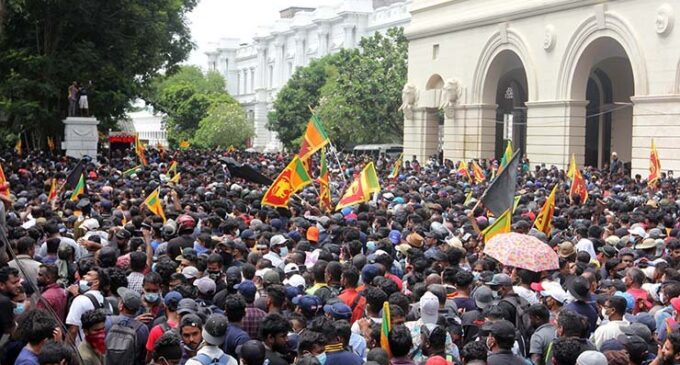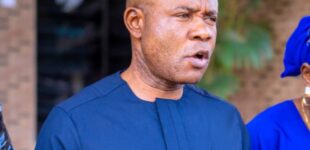Nigeria can still avoid the road to Colombo

Apart from being rich in the production of cinnamon and tea, and the aquatic splendour of its beaches which makes it a tourist destination, Sri Lanka is one country that comes to my consciousness, only when the game of cricket is mentioned. I do not know for others, but I do know that it is not one of those countries that one would easily remember when we talk of headline-grabbing political occurrences.
The Indian Ocean Island is a country with a unique ability to cater for its diversity, as exemplified by the fact that all the religious beliefs in the country have their symbols inscribed on the national flag. This is just like two cities serving as its capital – Sri Jayawardenepura Kotte is its legislative capital while Colombo, its largest city and financial centre, plays host to the executive and the judicial arms of its government. With a total land mass of 65,610 km, it has a population of no fewer than 22 million people. Due to its location in the Indian Ocean, it is not expected to be at loggerheads with any nation, powerful or otherwise, as it does not share a land border with any country which could be a source of conflict with its nearest neighbour.
So being in the news is not always what to expect, unless you’re talking about the One Day International series in cricket. But recently, the South Asian country found itself in the news for the wrong reasons. It has been battling its worst economic crisis in 70 years. The country has been dwelling within and around the precipice of being declared bankrupt as it could no longer honour its debt obligations. Food, fuel, medicine, and other essential daily needs of the citizens became subjects of rationing. Payment of civil servants’ salaries became an issue so much that they (the civil servants) were recently asked to stop coming to work amid non-availability of funds to pay workers and fuel to keep public transport running.
The managers of the country’s economy have been locked in talks, in the past couple of months, over a possible bailout credit facility to reflate the recessive economy but all to no avail. Talks were also held with other creditors, with a view to restructuring the debts, amidst other frantic moves to halt the country’s descent into the economic abyss.
Last Saturday, July 9, 2022, the matter went out of control as the protesting citizens, who had been on the street for a while, lost their patience with the government. President Gotabaya Rajapaksa, and Prime Minister Ranil Wickremesinghe have their offices occupied by the protesters. The anti-government protesters, on Sunday, continued to occupy the residences of President Rajapaksa and Prime Minister Wickremesinghe; a day after they stormed into the premises and set on fire one of the buildings in protest over the nation’s severe economic crisis.
According to Reuters, the anti-government protesters, who are angry over things like power blackouts, shortages of basic goods, and rising prices of foodstuff, have long demanded that Rajapaksa steps down but the retired military officer has resisted the demands, invoking emergency powers in an attempt to maintain control. The violence and the political chaos gripping the island nation come amid negotiations with the International Monetary Fund (IMF) over a rescue plan, as well as proposals to restructure its sovereign debt, both of which could be thrown into disarray. The whereabouts of the president (and the prime minister) who reportedly promised to resign on Wednesday, July 13, remain unknown.
No leader, not even Adolf Hitler, could confront with military force, the number of protesters on the streets, as seen in viral videos coming out of the country. That is what you get when the masses must have had it up to their necks. That was the point the people of France got to when the decision by King Louis XVI to increase the price of bread by an equivalence of one kobo and that triggered the famous French Revolution (of 1789) following which the monarchical system of government was jettisoned for a republican system that operates there till date.
There is a great deal of lesson to be learnt by Nigerian political leaders from the current Sri Lankan economic tumult for those who think that the French and other revolutions around the world took place eons ago and may therefore not be replicable in the 21st century.
Nigeria, though blessed abundantly with crude oil deposits, has continued to depend on the importation of refined products, which has made a mess of what should have been the gains of an oil-bearing country in an ideal situation. The local pump price has been exposed to the volatility of the global oil market which sees price fluctuate to both extremes from time to time.
Nigeria has, for a very long time, been unable to meet its Organisation of Petroleum Exporting Countries (OPEC) quota in oil production owing to a combination of factors like youths’ restiveness in the oil-bearing region of Niger Delta. The little produced is being stolen through bunkering. Now, OPEC has increased Nigeria’s August 2022 oil production quota by 1.5% to 1.826 million barrels per day (mbpd) from 1.799mbpd in July 2022. I can place a bet on it that it would take a miracle for the country to meet this. OPEC, for instance, announced the increase in Nigeria’s oil production quota from the 1.735mbpd target approved in May 2022 to a new target of 1.772mbpd for June 2022. Meanwhile, 1.24mbpd was the average target in the months of March and April, no thanks to factors like oil theft, illegal refining, and pipeline vandalism.
These factors, especially the last one, have been militating against the proper functioning of local refineries. After crude is refined in Warri or Port Harcourt, it has to be transported to various depots across the country through pipelines. Vandals use the avenue to break up the pipe and siphon massive amounts of refined products. The same goes for crude being pumped from a place like Escravos to either point of export or refineries like Kaduna, Warri and Port Harcourt. This is a criminal activity perpetrated by pirates in the Gulf of Guinea and terrestrial criminals, in the hinterland.
This has now occasioned the dual problems of loss of revenue, and over-dependence on the importation of petroleum products which is now killing the economy; if it has not already. There is a concomitant balance of payment deficit. The budget deficit is another of its by-product as a large chunk of the annual budget is spent on subsidising the products like premium motor spirit. Diesel and kerosene that are not being subsidised are taking an inflationary toll on the economy as their prices are subjected to the volatility of foreign exchange rates. Prices of foodstuff are skyrocketing. Life, as a result, is becoming more unbearable for an average Nigerian as poverty in the land becomes more profound.
Another major factor that has contributed to the high prices of foodstuff is insecurity. Farming has become a very suicidal vocation in Nigeria because kidnappers lurk in every part of the forests, waiting for the next farmer victim. Incessant farmer-herders clashes, that is often time bloody, do not give room for productive activities to an optimum level. In parts of the country, kidnappers now knock on the doors of targets who refuse to travel thereby giving no room for them to pounce. People get killed in places of worship. The president’s convoy is not spared. Detention facilities around the country, especially within the seat of power, get bombed while terrorists in detention get freed. Kuje is the latest. The most frustrating part of it is that the Muhammadu Buhari-led federal government appears to be conceding the monopoly of violence to these non-state actors.
The purchasing power of an average wage and salary earner in the country has been eroded by “imported inflation”. The self-employed are not faring any better. Micro, small and medium-scale enterprises are dying as there is close to zero electricity to power the economy. The national power grid collapses as frequently as a lizard falls off a tree. Diesel that should serve as an alternative is a no-go area. The price per litre went up from ₦360 to ₦820 — over 200% increase. It has a domino effect even on its close substitutes and other goods as trucks transporting goods and even people across the length and breadth of the country run on diesel. This means that the cost would be passed on to the final consumers of such goods except for those who have the gods crack their palm kernel for them (apologies to Chinua Achebe) through access to some kind of endowment fund or government money.
Nigerians are finding it more and more difficult to feed as the day goes by. Bread is gradually being taken off the common man’s dining table. The inflation rate as of May 2022 was 17.71% according to the inflation report published by the National Bureau of Statistics. A loaf of bread sold for ₦350 about seven years ago now goes for ₦800. A bag of rice is now between ₦30,000 and ₦35,000 depending on your preference between local and foreign ones. Access to medical care services is not left out. An A-grade anti-malaria drug now goes for between ₦1,500 and ₦2,000. The pump price of petrol, though officially ₦165 per litre, is now being sold at between ₦190 and ₦250 per litre across the nation depending on your location. This is a factor that, like the price of diesel, affects the prices of goods and services because it is the major source of power and again, a large portion of our means of transportation depends on petrol to operate.
Government agencies whose core statutory responsibilities are to regulate relevant industries have turned themselves into money-making ventures, leaving their regulatory roles to suffer neglect. They try to out-compete themselves in a bid to project themselves as the most lucrative government agency, thereby oiling the curriculum vitae of the chief executive officer of such an agency in readiness for the next appointment upon expiration of the current tenure. These agencies, in the process, make sustenance an impossibility for MSMEs which is the fuselage of the nation’s economy.
Now that Nigeria seems to have gathered all the required raw materials to go the Sri Lankan way, I am convinced that we can still avoid travelling through the Colombo route. This is provided our pseudo “socio-economic managers” quit the stage to give room for people who have the requisite knowledge and skills set with a genuine sense of patriotism to midwife the economy back to prosperity.
The president, the man on whose table the buck stops, must demonstrate that testicular fortitude to hold the people he puts in positions of responsibility accountable by exercising his constitution-granted power of “hiring and firing”, given the developments in the respective sectors. President Muhammadu Buhari must stop gratifying failure through tenure extension so that his appointees can be on their toes at all times. We are getting pretty close to the limit of the elasticity of Nigerians’ patience with incompetence, mediocrity, and sheer lack of empathy by the political elites.
The Sri Lankan political leaders, especially the president and the prime minister, did not expect the people’s rage to come this quick. They were caught napping as they took the resilience of the people for granted. As I pound my keyboard trying to couple my thoughts into coherence, nobody has an inkling as to the whereabouts of the two leaders, one of whom is expected to turn in his resignation letter today, Wednesday, July 13, 2022.
Things still appear to be normal in Nigeria at the moment that the federal government is almost borrowing to pay salaries. But by the time the remittance from the Nigerian National Petroleum Company (NNPC) stops coming and the federal, states, and the few existing local governments stop being able to pay workers’ salaries, it might be too late for the politicians to do the most honourable, cheapest and the easiest thing – resign. It is advisable they quit the stage now to allow those with the intellectual capacity, and sincerity of purpose to come on board and fix the economy. Otherwise, it would soon be May Day. If it does happen in Nigeria, that of Sri Lanka would pale into insignificance.
There is, however, still hope that we can avoid the route to Colombo. The current political leadership in Nigeria cannot afford to have 20 million Nigerians (just 10% of our total population) on the street protesting. They, the politicians would become asphyxiated politically, economically, and even physically, if as many as 20 million Nigerians take to the street.
And to the masses who are always at the receiving end of the gross misgovernance by our pseudo “philosopher kings”, we have the greatest role to play in shaping the destiny of the country especially as the 2023 general election approaches. When the rich want to hire from among the poor to run their private companies, they go for the best among us. I must admit (on a very sad note though) that the over-monetization of the political process has systemically priced some political office away from the reach of the not-so-rich in Nigeria. But be that as it may, we still have not lost out completely as they would still come begging for our votes in the months ahead. Then, we must ensure we elect the best of the best among them too. We would be doing ourselves a world of favour if we jettison ethno-religious considerations, and focus on the capacity to deliver in arriving at our choices. Somebody with knowledge, the courage to take tough decisions, and vision backed by an economic blueprint; someone who has the ability to unite the already divided people across ethno-religious lines, and above all, not lacking in empathy, deserves our support.
A word, they say, is enough for the wise.
Abubakar writes from Ilorin. He can be reached via 08051388285 or [email protected]
Views expressed by contributors are strictly personal and not of TheCable.












There are no comments at the moment, do you want to add one?
Write a comment